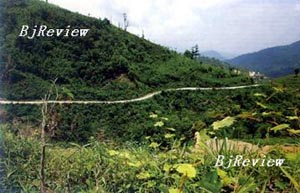
On a flight to Yunnan Province in September 2006 to cover a story on joint road building programs between China and South Asian nations, I began to wonder how the province got its name Yunnan, meaning south of clouds. However, throughout my trip I was too shy to ask local people about the origins and meaning of the province's name. Whenever our bus was speeding along the spiraling mountain roads, I could see that we were traveling through clouds. More than once, I had the urge to snatch a piece of cloud through the bus window. I guessed this is how the province on a plateau got its name.
Compared with the blue skies over the grassland in China's Northwest, the sky, mountain and water in Yunnan seems to have a lighter color. Many times, the sceneries in ancient villages-- waterwheels on a small river, gardens full of flowers and birds, vendors walking on stone streets--often reminded me of my hometown, which is on the southern bank of the Yangtze River.
The scenery in Yunnan also has a more rugged side like the galloping Nujiang River, one of the most undisturbed rivers in China, and lofty mountain peaks. A high mountain sits on the western bank of the river, dropping dramatically to form a valley 100 meters deep at an altitude of 3,360 meters. If you stand at the bottom of the valley and look up, all you can see is circular view of the bright Yunnan sky. Local people call this valley "stone moon."
Local legend has it that, the valley was formed during a flood thousands of years ago, when the son of heaven pierced the mountain with three arrows in order to scare a dragon, which controlled the water supplies, and offer people a safe passage to avoid drowning in the floods.
This region is inhabited by 22 ethnic minority groups, with a population accounting for 92 percent of the total population. In the 1950s, it experienced the transition from a rather primitive society to a socialist society.
The views of sharp valleys, snow mountains and wild rivers make Yunnan a tourist paradise. But such a landscape creates harsh living conditions for local people. About 98 percent of the land is mountainous and farmland is mainly restricted to mountainside terraces and ridges. However, according to government regulations, farmland on steep mountainsides must be reforested. Besides the natural wonders, visitors will also be amazed at the harmonious existence of complex ethnic and religious traditions here. A quarter of the local population is religious, being Chritians, Catholics or Tibetan Buddhists.
Translated by LI LI
Note: The author is a Beijing Review reporter. His stories from this visit to Yunan can be found at http://www.beijingreview.com.cn/06-CN/06-12-12/china-1.htm
| 